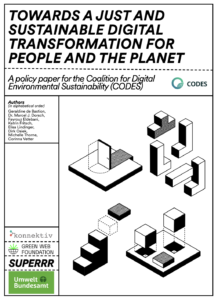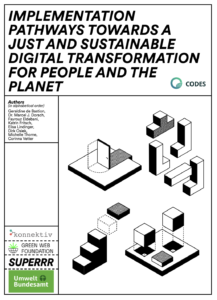We provided strategic consultancy on digital sustainability with a global governance perspective for the Coalition for Digital Environmental Sustainability (CODES) in collaboration with Konnektiv and Superrr Lab.
project Summary
The rapid expansion of digital technologies brings environmental and social challenges, such as rising energy consumption, growing e-waste and the monopolisation of digital infrastructure. The goal of this one-year long project for the Coalition for Digital Environmental Sustainability (CODES) was to guide policymakers, industry leaders and civil society to identify key leverage points for integrating sustainability and digital transformation into global governance.
We delivered this work in collaboration with Konnektiv and Superrr Lab. Through research, workshops and futuring methods, we provided strategic consultation and also derived future pathways to improvements for the German government. We developed an in-depth analysis of sustainable digital transformation, digital infrastructure, and global policy interventions in order to create a more equitable and sustainable digital future for all.
It was no easy task to distill the complex trends of digitalisation and the green transition and to advocate for a public interest perspective grounded in the principles of justice and sustainability. The work with the Green Web Foundation and the other partners in this project, Konnektiv and Superrr Lab, meaningfully contributed to our coalition’s understanding of the issues and informed our strategies for action. We can highly recommend working with them.
Marcel Dorsch & Dirk Osiek, Umweltbundesamt
The Client
The Coalition for Digital Environmental Sustainability (CODES) was founded in 2021, in response to the UN Secretary-General’s roadmap for digital cooperation. It consists of different members and functions as a network between governments, researchers, and civil society working on digital sustainability and global governance.
CODES has eight founding co-champions: Republic of Kenya, UNDP, Sustainability in the Digital Age, ITU, Umweltbundesamt, Future Earth, UN Environment Program, International Science Council, and the United Nations Office of the Secretary-General’s Envoy on Technology.
One of those co-champions, the Umweltbundesamt (German Environment Agency), took the lead role for CODES and worked in close collaboration with us throughout the entire project. The goal for the client was to achieve a better understanding of the current global developments of digital sustainability, and to create research insights that could inform policy making.
What activities did we undertake?
This project had multiple stakeholders and members at different times. Core contributors were: Konnektiv (an agency), Superrr Lab (a non-profit, working on feminism and technology) and ourselves, Green Web Foundation. We worked in German and English. The Umweltbundesamt (German Environment Agency) took the lead role for CODES and worked with us in close collaboration.
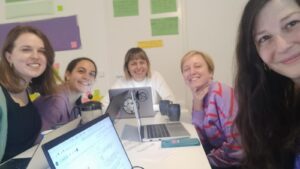
In order to meet the goals, we used different research methods such as:
- desk research
- mapping of global governance initiatives and their projects at the intersection of digitalisation and sustainability
- qualitative interviews with key stakeholders from governments, global governance, and civil society
- workshops with different participants and methods (futuring methods, co-creation, briefings), many of the attendees worked in global fora (eg. UNESCO, UN, International Energy Agency)
- future visioning methods that led to different pathways for CODES and the network in the upcoming years
- consultation and feedback on a policy paper written by Umweltbundesamt (German Environment Agency)
- monthly client meetings to present work in progress and get feedback
- presentation of the work at different events, for example at the Woche der Umwelt in Berlin and re:publica 2024
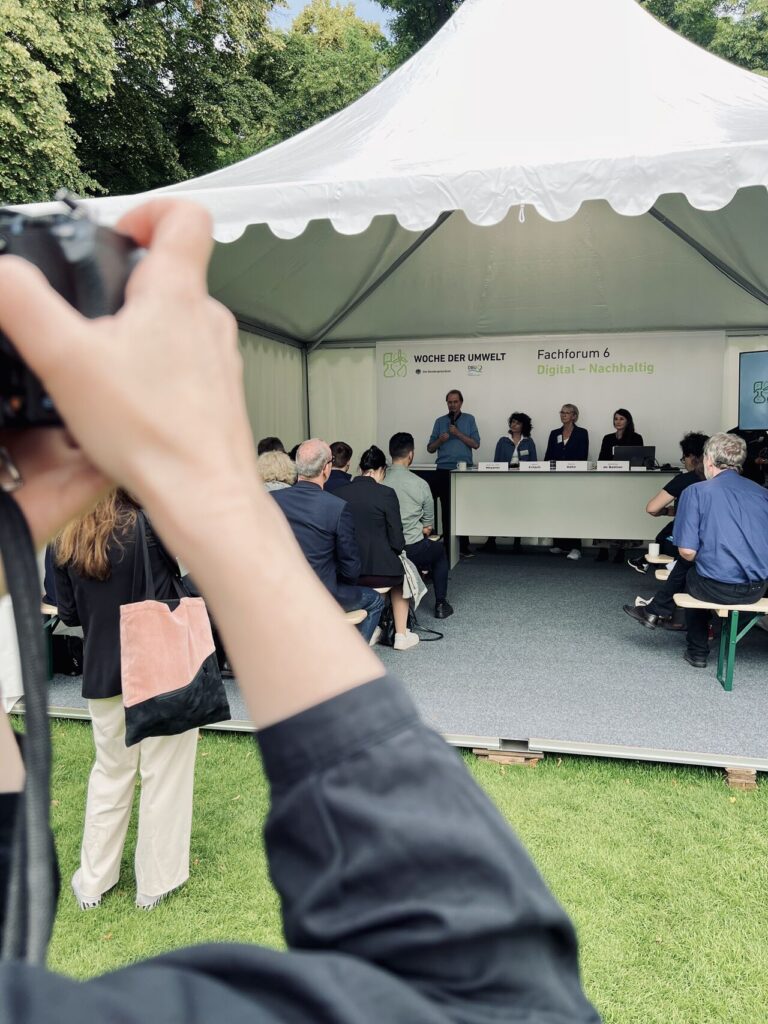
Picture by Umweltbundesamt
The deliverables
Four final reports were produced and published. Layout and design was provided by Superrr Lab for all four reports.
1. Towards a Just and Sustainable Digital Transformation for People and the Planet
This paper explores the intersection of sustainability and digital transformation from a global governance perspective and examines current global governance initiatives that work on these topics.
Written and conceptualised by Konnektiv, Superrr Lab, and Green Web Foundation. Edited in collaboration with Umweltbundesamt (German Environment Agency).
Key insights
Intersectionality of sustainability and digital transformation
- Digital transformation and sustainability are interconnected but are often treated as separate processes in policy discussions.
- Impacted communities, especially in the so-called ‘Global South’, lack decision-making power in global governance.
- An intersectional approach is needed to integrate digital transformation and sustainability with social justice goals.
Lack of coherent strategies for sustainable digital transformation
- Many policy initiatives address either digital transformation or sustainability but fail to combine the two effectively.
- There is an opportunity to mainstream sustainability within digital policy by engaging key global institutions such as UNCTAD, UNESCO, and the ILO.
Need for a justice-oriented approach in global governance
- Current digital policies prioritise efficiency and technological solutions without addressing larger structures of power and social injustices.
- Structural changes are needed to prevent digital technologies from exacerbating inequalities and ensure they benefit people and the planet equally.
2. Implementation Pathways Towards a Just and Sustainable Digital Transformation for People and the Planet
This paper builds on the findings of the first policy paper and outlines fifteen possible strategic pathways towards a just and sustainable digital transformation for different stakeholders from industry over civil society to governments.
Written and conceptualised by Konnektiv, Superrr Lab, and Green Web Foundation – and in close collaboration with Umweltbundesamt (German Environment Agency).
Key insights
Bridging the gap between digital transformation and sustainability
- Based on the findings from the first policy paper, this paper identifies several global policy initiatives that still treat digital transformation and sustainability as two separate topics, such as OECD’s Global AI Ethics Observatory that does not include environmental sustainability.
- The fifteen implementation pathways for a just and sustainable digital transformation identify leverage points in these fora for overcoming these gap and shaping meaningful action in the future.
Deepdive 1: Set global emissions reduction target for digital services
- This pathway proposes establishing a global emissions reduction target specifically for digital services, similar to how industries like aviation and shipping have emissions caps. Given the rapid rise of AI, cloud computing, and data centers (many of which consume massive amounts of energy) this is an urgent and innovative policy step. If successful, this could reshape sustainability standards in the tech industry and beyond.
- Key impact: Setting a global emissions reduction target would create accountability for tech companies and policymakers to track digital carbon footprints. It encourages independent reporting and open data to prevent greenwashing. It connects digital transformation to climate goals in a meaningful way.
- Key challenge: Countries and corporations might resist transparency in emissions reporting if there is no regulation in place. Standardising emissions data globally is a complex but necessary task.
Deepdive 2: AI, ethics, and sustainability
- AI is rapidly transforming industries and societies at large, but most discussions around AI focus mainly on human rights, ethics and biases. The massive environmental impact of AI is largely ignored. This pathway explores avenues to include sustainability in global governance AI ethics discourses, ensuring that AI models don’t come at the cost of the planet. It shifts the AI debate from just “Is it fair?” to “Is it fair and sustainable?”. Ideas are to include environmental sustainability in the AI for Good Summit from ITU or the AI Action Summit in Paris.
- Key impact: Expanding AI ethics to include environmental sustainability and pushing for mandatory sustainability reporting from AI companies (for example, how much energy and water their models consume). Also encouraging global policymakers (like UNESCO or the OECD) to integrate sustainability into AI ethics fora.
- Key challenges: There is a lack of transparency on the energy use of AI models. Given the multinational character AI companies have, transparency needs to be encouraged from a global perspective.
3. Contributions to a Framework Approach for Sustainable Digital Infrastructures
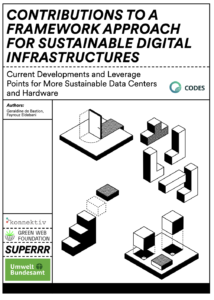
This paper contributes to the framework approach for sustainable digital infrastructures by the Umweltbundesamt (German Environment Agency) through expert inputs, two workshops and further consultations.
Written and conceptualised by Konnektiv in collaboration with Umweltbundesamt (German Environment Agency). Edited by Superrr Lab and Green Web Foundation.
Key insights
Data centers should be treated as critical digital infrastructure
- The biggest cloud providers (AWS, Microsoft Azure, Google Cloud) control nearly 75% of the global cloud market, leading to monopolistic ownership structures.
- The paper argues for recognizing data centers as critical infrastructure, which would push policymakers to introduce regulations preventing monopolies and promoting community-owned alternatives.
- This shift could empower local communities and ensure data center expansion does not disproportionately harm the environment and local economies.
Sustainable data management and the concept of “data sobriety”
- The rapid growth of AI and digital services has led to excessive data storage and processing, which increases worldwide energy consumption.
- The paper introduces the idea of “data sobriety”: only collecting, storing, and processing the necessary amount of high-quality data to minimize the environmental impact.
The right to repair and open-source hardware for circular economy
- Many tech companies design devices to be difficult to repair, leading to increased hardware consumption and increased e-waste.
- The paper highlights Right to Repair policies and modular, open-source hardware as key strategies to extend device lifecycles, reduce waste, and promote fairer access to technology.
4. Germany’s Role for a Just and Sustainable Digital Transformation
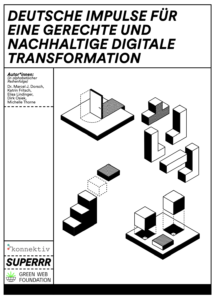
This paper explores Germany’s role in a just and sustainable digital transformation and to identify possible levers of both global and local policy making. It is written in German.
Written and conceptualised by Green Web Foundation and Superrr Lab in close collaboration with Umweltbundesamt (German Environment Agency).
Key insights
Germany as a global leader in just and sustainable digital transformation
- Given that digitalisation and sustainability are often treated separately on a global governance level, Germany has the opportunity to take a leading role in advocating for a just and sustainable digital transformation.
- A key focus should be integrating sustainability principles and digitalisation into UN, EU, and OECD processes.
- Germany can actively shape a just and sustainable digital future through political leadership, transparent infrastructure, and strong civil society engagement.
Data centers as a key area for transparency and sustainability
- Energy consumption from AI and data centers is rising rapidly, posing risks to global climate goals.
- Germany can serve as an international role model through its data center registry, setting clear public sustainability standards for digital infrastructure.
- Open data and transparency can help promote energy efficiency of data centres.
An active civil society as a driver for just and sustainable digital transformation
- German civil society plays a crucial role in the debate on just and sustainable digital transformation.
- Organisations like Bits & Bäume, AlgorithmWatch, and the Green Web Foundation can be key partners in critically and inclusively shaping digital technologies.
- The focus should not only be on “greening digital services” but also on social-ecological impact, fairness, and digital sovereignty.
Curious?
If you want to join CODES, you can get involved as an individual or join the coalition as an organisation.
If you would like to learn more about our consultancy services or get in touch to discuss your requirements, visit our commercial services page.
